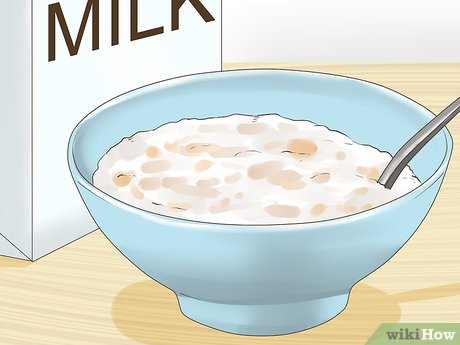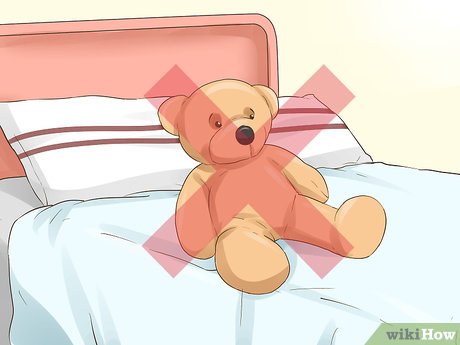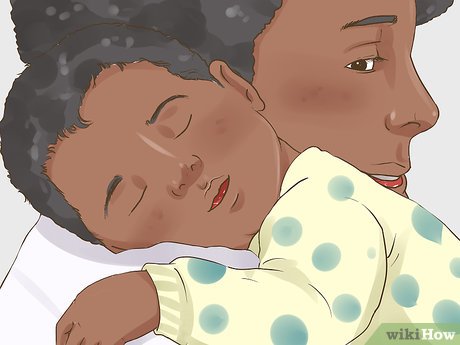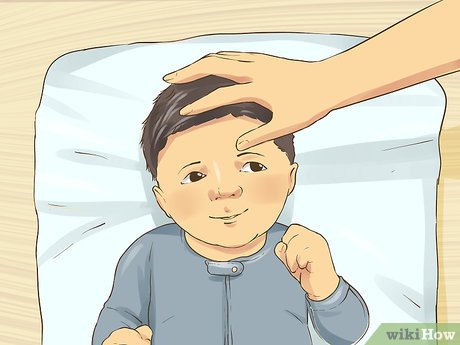How to Help Children Sleep
Part 1 of 3:
Establishing a Bedtime Routine
-
 Select a bedtime based on your child's needs. You want to make sure your child gets an appropriate amount of sleep for their age. Know how much sleep your child needs. Then, select a bedtime that allows your child to get an adequate amount of sleep each night.[1]
Select a bedtime based on your child's needs. You want to make sure your child gets an appropriate amount of sleep for their age. Know how much sleep your child needs. Then, select a bedtime that allows your child to get an adequate amount of sleep each night.[1]- Toddlers need 9.5 to 11.5 hours of sleep each night. They also need about 1.5 to 3.5 hours of sleep during the day.[2]
- Children between the ages of three and five need about 13 hours of sleep each night. A child will also begin to nap less during this age.
- Children between the ages of five and 12 should not sleep during the day. You should make sure they get 9 to 11 hours of sleep each night.
- Teenagers should also not nap during the day. A teenager should get between 8.5 and 9.5 hours of sleep a night.
-
 Dim the lights when bedtime gets close. Bright lights can disrupt the natural circadian rhythm. This rhythm acts as your internal clock. It regulates your physiological process that tells your body when to sleep, eat, and awake. Instead of adapting to regular day/night schedules, our brains end up stimulated all the time in the presence of artificial light. To encourage a child to begin winding down, dim the lights as bedtime approaches.[3]
Dim the lights when bedtime gets close. Bright lights can disrupt the natural circadian rhythm. This rhythm acts as your internal clock. It regulates your physiological process that tells your body when to sleep, eat, and awake. Instead of adapting to regular day/night schedules, our brains end up stimulated all the time in the presence of artificial light. To encourage a child to begin winding down, dim the lights as bedtime approaches.[3]- After sunset, dim the lights in your home. This may help children begin to feel sleepy as their bedtime approaches.
- Avoid turning on bright lights in your child's room. If you do a bedtime ritual in your child's room, like reading them a book, do so with the lights dimmed.
-
 Find ways to help your child relax. Children, like adults, feel stress throughout the day. School and a social life can leave a child feeling wound up by bedtime. Find a relaxing bedtime ritual that will help your child settle down in preparation for sleep.[4]
Find ways to help your child relax. Children, like adults, feel stress throughout the day. School and a social life can leave a child feeling wound up by bedtime. Find a relaxing bedtime ritual that will help your child settle down in preparation for sleep.[4]- Pick a ritual that encourages relaxation. Watching television or doing something physical will only stimulate your child.
- Instead, focus on low key activities. Play soothing music. Read your child a book. Have your child take a warm bath.
-
 Provide healthy bedtime snacks. If your child is hungry, they may struggle to sleep. Providing them with a snack can help, but make sure it's something healthy. Something sugary or high in fat can leave a child jittery or not feeling well. A healthy snack will prevent hunger without disrupting sleep.[5]
Provide healthy bedtime snacks. If your child is hungry, they may struggle to sleep. Providing them with a snack can help, but make sure it's something healthy. Something sugary or high in fat can leave a child jittery or not feeling well. A healthy snack will prevent hunger without disrupting sleep.[5]- Healthy proteins and carbs tend to help a child sleep. Try giving your child a bowl of oatmeal with milk or a piece of whole wheat toast with peanut butter.
- Bananas, poultry, eggs, cheese, and tuna can also help with sleep.
-
 Make sure the bedroom is comfortable. A cozy bedroom is important for sleep. If your child is uncomfortable in their bedroom, they're unlikely to nod off easily. Make any adjustments necessary to provide your child with a good sleeping environment.[6]
Make sure the bedroom is comfortable. A cozy bedroom is important for sleep. If your child is uncomfortable in their bedroom, they're unlikely to nod off easily. Make any adjustments necessary to provide your child with a good sleeping environment.[6]- Make sure all sleeping materials are comfortable. If a child finds their pajamas or sheets itchy, too soft, or too rough, they may struggle to sleep. Replace any materials a child dislikes.
- Make sure no noises, lights, or sounds can disrupt a child's sleep. Keep the door closed to keep out outside sounds. Make sure the blinds block any lights from the street. Avoid cooking anything with strong smells after a child is put to bed, as this could wake them up.
-
 Be consistent with bedtime rules. You want to make sure your child understands they need to sleep. Be firm about your bedtime rules. Each night, remind a child when bedtime is getting close. If a child wanders out of bed after bedtime, calmly redirect them to their room.[7]
Be consistent with bedtime rules. You want to make sure your child understands they need to sleep. Be firm about your bedtime rules. Each night, remind a child when bedtime is getting close. If a child wanders out of bed after bedtime, calmly redirect them to their room.[7]- Routine can help sleep. A child's natural circadian rhythm will adjust to a regular sleep/wake cycle. Make sure your child goes to sleep and wakes up at roughly the same times each day.[8]
Part 2 of 3:
Assuring Your Child is Sleepy Near Bedtime
-
 Avoid caffeine and sugar before bed. Monitoring daytime foods can also help with sleep disturbances. Caffeinated beverages and caffeine-rich foods should be avoided at least four hours prior to bedtime.[9] Stimulating food and drinks before bed can make a child jittery and interfere with sleep. During the evening hours, avoid foods with sugar and caffeine.[10]
Avoid caffeine and sugar before bed. Monitoring daytime foods can also help with sleep disturbances. Caffeinated beverages and caffeine-rich foods should be avoided at least four hours prior to bedtime.[9] Stimulating food and drinks before bed can make a child jittery and interfere with sleep. During the evening hours, avoid foods with sugar and caffeine.[10]- If a child is thirsty before bed, give them water instead of juice or soda.
- Read nutritional labels. A lot of unexpected foods have added sugar. You may find there is a lot of sugar in things like canned pasta sauce and bread.
-
 Keep toys out of the bed. A child's bed should only be used for sleeping. This way, a child's brain will associated the bed with rest. This can help your child fall asleep faster; therefore, keep toys out of the bed.[11]
Keep toys out of the bed. A child's bed should only be used for sleeping. This way, a child's brain will associated the bed with rest. This can help your child fall asleep faster; therefore, keep toys out of the bed.[11]- Make sure your child does not play in their bed. When they play in their room, have them do so outside of their bed.
- If your child gets anxious sleeping alone, it's okay to provide a transitional object. Your child can, say, take one toy or blanket to bed with them. Make sure the child only cuddles this object and does not try to play with it.
-
 Power down electronics close to bedtime. The light from electronic screens, like a TV, phone, or tablet screen, can stimulate brain activity. Make sure to power down these devices before bed.[12]
Power down electronics close to bedtime. The light from electronic screens, like a TV, phone, or tablet screen, can stimulate brain activity. Make sure to power down these devices before bed.[12]- You should also keep devices such as alarm clocks and baby monitors at least three feet from your child's bed.
-
 Plan naps strategically. After the age of five, your child should not be napping during the day. Discourage naps after this age; however, if your child still needs a nap, make sure to plan nap time in a way that won't interfere with sleep. If your child needs a daytime nap, make sure they take it before 4 pm. Napping later than this can cause difficulty falling asleep.[13]
Plan naps strategically. After the age of five, your child should not be napping during the day. Discourage naps after this age; however, if your child still needs a nap, make sure to plan nap time in a way that won't interfere with sleep. If your child needs a daytime nap, make sure they take it before 4 pm. Napping later than this can cause difficulty falling asleep.[13] -
 Maintain a consistent wake time. Hours awake are equally important as hours of sleep. Maintaining a consistent awake time helps to establish a good awake and sleep schedule.
Maintain a consistent wake time. Hours awake are equally important as hours of sleep. Maintaining a consistent awake time helps to establish a good awake and sleep schedule.
Part 3 of 3:
Addressing Underlying Problems
-
 Do not use bedtime as a punishment. You want your child to associate sleep with relaxation. If you use sleep as a way to punish a child, they will develop feelings of stress associated with bedtime. This can easily interfere with sleep.[14]
Do not use bedtime as a punishment. You want your child to associate sleep with relaxation. If you use sleep as a way to punish a child, they will develop feelings of stress associated with bedtime. This can easily interfere with sleep.[14]- When your child is misbehaving, refrain from threatening to send them to bed.
- Bedtime should be something a child comes to look forward to. Instead of threatening bedtime as a punishment, teach your child to associate pleasant, relaxing activities with going to sleep.
-
 Reduce fear and anxiety with a night light. Many children are nervous about going to sleep alone. You want your child to develop independence when sleeping, but you have to ease your child into this gradually. A child who is afraid of the dark or generally anxious will benefit from a night light.[15]
Reduce fear and anxiety with a night light. Many children are nervous about going to sleep alone. You want your child to develop independence when sleeping, but you have to ease your child into this gradually. A child who is afraid of the dark or generally anxious will benefit from a night light.[15]- Make sure the night light is dim. Get a night light specifically designed to encourage sleep instead of doing something like leaving the closet light on.
- It can also help to let your child sleep with a favorite toy or blanket.
-
 Talk to your child about stress. Many children cannot sleep due to stress. Make sure to talk to your child each day and encourage them to open up about the stress in their lives. Allowing your child to talk, and then providing reassurance, can reduce stress and then help with sleep.[16]
Talk to your child about stress. Many children cannot sleep due to stress. Make sure to talk to your child each day and encourage them to open up about the stress in their lives. Allowing your child to talk, and then providing reassurance, can reduce stress and then help with sleep.[16]- Always ask your child about their life. Ask how things are going at school, with their friends, and about other aspects of their life.
-
 Consider therapy for stress-related sleep problems. If your child seems to have a lot of anxiety that prevents sleep, therapy may help. If you're struggling to fix sleep problems on your own, make an appointment with a child therapist to address the issue.[17]
Consider therapy for stress-related sleep problems. If your child seems to have a lot of anxiety that prevents sleep, therapy may help. If you're struggling to fix sleep problems on your own, make an appointment with a child therapist to address the issue.[17]- Look for a therapist that specializes in sleep issues.
- Cognitive behavioral therapy, which teaches children to adjust negative thought and behavioral patterns, may be particularly beneficial for sleep problems.
-
 Have a physician treat medical issues. A variety of medical conditions can inhibit sleep. Things like allergies, a stuffy nose, skin problems, and other aches and pains can interfere with sleep. If your child chronically complains about physical ailments that affect their sleep, make an appointment with their pediatrician to address the issue.[18]
Have a physician treat medical issues. A variety of medical conditions can inhibit sleep. Things like allergies, a stuffy nose, skin problems, and other aches and pains can interfere with sleep. If your child chronically complains about physical ailments that affect their sleep, make an appointment with their pediatrician to address the issue.[18]- Go over any medications your child is taking with your doctor. Some medications may affect sleep.
Share by
Samuel Daniel
Update 07 April 2020















